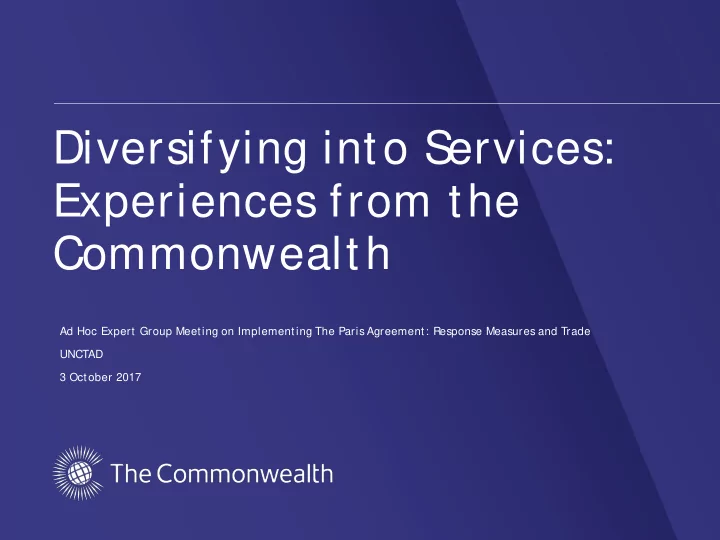

Diversifying into S ervices: Experiences from the Commonwealth Ad Hoc Expert Group Meeting on Implement ing The Paris Agreement: Response Measures and Trade UNCTAD 3 Oct ober 2017
Introduction • The Commonwealth is home to 2.4 billion people – 60% under 30 years – and includes both advanced economies and developing countries. • Our members, especially S IDS , LDCs and S S A, are highly vulnerable to the impacts of climate change. • They also have the least capacity to diversify their production and exports in response to these impacts. • The Commonwealth is a global advocate about the environmental, economic and social risks of climate change - and the need for regenerative development. • S ecretariat provides technical assistance to assist member states develop trade policies and export strategies to diversify into new products and services. • A Commonwealth Climate Finance Access Hub assists small and vulnerable countries to access and effectively use international climate finance.
Climate Change and the Commonwealth • S ome Commonwealth members have high export concentrations in climate sensitive sectors (agriculture, mining, fisheries, forestry, tourism) – others may be affected by mitigation policies (e.g. tourism, fossil fuels). • S trategies: climate-proofing; tech leapfrogging; economic/ export diversification to build resilience. • Focus has been on merchandise exports, especially manufacturing. • S ervices play increasingly important role in GVCs: direct (financial services, telecoms IT , logistics) and indirect - incorporated in manufacturing products. • S ervices already significant % of GDP in Commonwealth: > half for low-income economies and rises. • Insufficient attention to non-tourism and -financial services for export.
S tylised facts: S ervices and the Commonwealth • Cross-border services trade now for 23% of total world exports. • S hare of developing countries over 20% (2014), up from 3% in 1970. • Data constraints for Commonwealth developing countries, especially LDCs and S IDS , and the capacity of local firms to potentially supply regional and global markets. • Role of trade - and services exports – in supporting 2030 Agenda for S ustainable Development and S DGs. • S pecific trade challenges of members: • Size • Geography • High trade costs • Export composition • Debt
Commonwealth LDCs’ and S IDS ’ shares in world services exports (1995-2015) 5 4,5 4 3,5 3 Percent 2,5 2 1,5 1 0,5 0 1995 1996 1997 1998 1999 2000 2001 2002 2003 2004 2005 2006 2007 2008 2009 2010 2011 2012 2013 2014 2015 SIDS LDCs
Changes in sectoral services export competitiveness, 2010-2014, by Commonwealth region 5 4 3 2 Index 1 0 -1 -2 -3 Sector Europe Asia Africa Pacific Caribbean & Americas
Changes in sectoral services export competitiveness, 2010-2014, by Commonwealth country group 2 1 0 Transport Travel Communication Construction Insurance Finance Computer Other Business Services Index -1 -2 -3 -4 LDC SIDS
Policy Issues • Crucial role for policies in boosting services export competitiveness. • Developing services export capacity – building productive capacity in terms of services exports could be an important goal of AfT programmes over the medium term. • Providing a stable and conducive business environment with appropriate support mechanisms. • Reducing costs and promote connectivity: digital, maritime, aviation • Leveraging the WTO S ervices Waiver for LDCs. • Using the Green Climate Fund for climate-specific investments to adapt and diversify economies. • Harnessing regional integration policies to trigger cross-border value chains.
Presented by: Dr Brendan Vickers Email: b.vickers@ commonwealth.int 3 Oct ober 2017
Recommend
More recommend